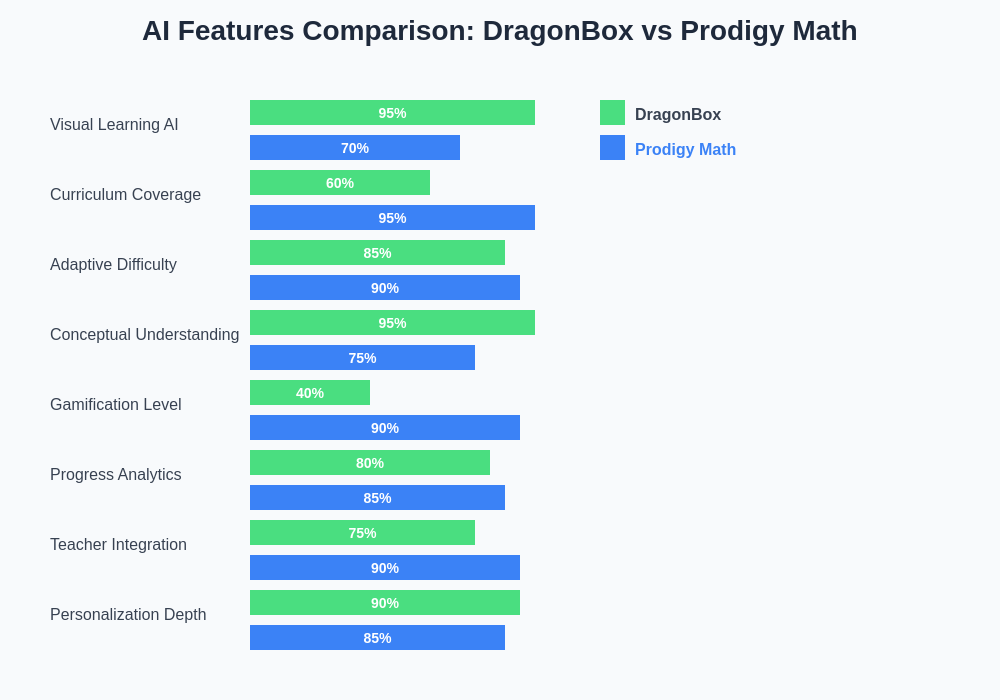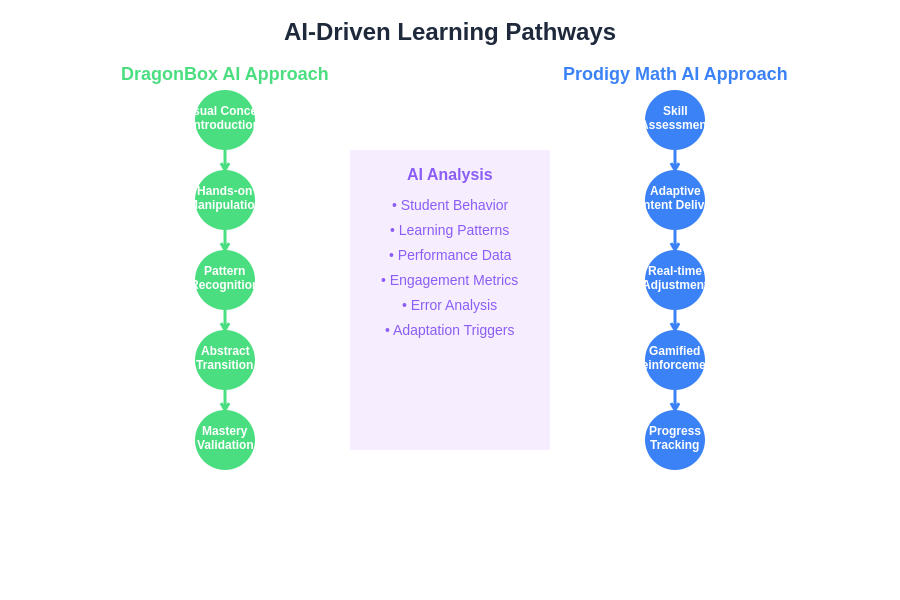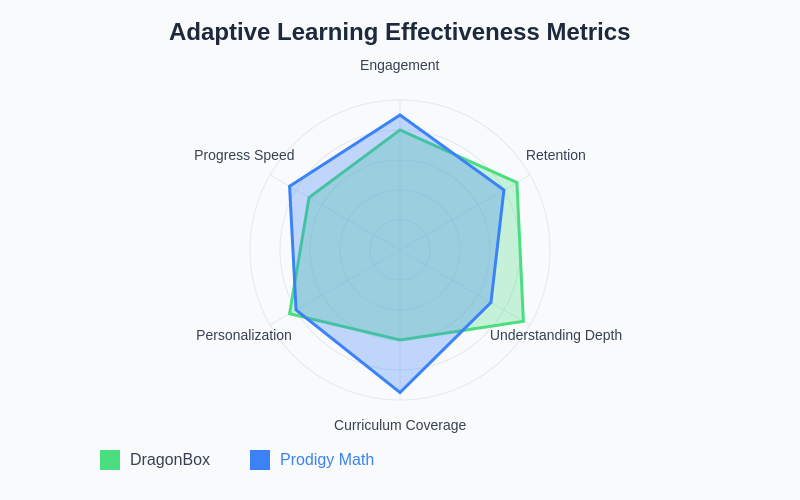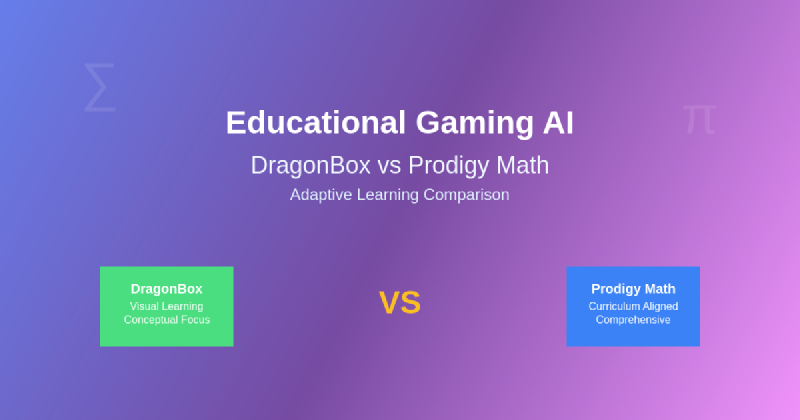The intersection of artificial intelligence and educational gaming has created a revolutionary landscape where mathematical learning transcends traditional boundaries through sophisticated adaptive systems that respond to individual student needs in real-time. At the forefront of this transformation stand two prominent platforms, DragonBox and Prodigy Math, each employing distinct AI methodologies to create personalized learning experiences that make mathematics both engaging and accessible to learners across diverse skill levels and learning preferences.
Explore the latest educational AI innovations to discover how technology is reshaping the future of learning and creating unprecedented opportunities for personalized education. The evolution of educational gaming represents more than entertainment value; it embodies a fundamental shift toward intelligent tutoring systems that adapt, learn, and evolve alongside each student’s unique educational journey.
The Revolution of AI-Powered Educational Gaming
Educational gaming powered by artificial intelligence has fundamentally transformed how students interact with mathematical concepts, moving beyond static curriculum delivery to create dynamic, responsive learning environments that adapt to individual cognitive patterns and learning velocities. These sophisticated systems employ machine learning algorithms to analyze student behavior, identify knowledge gaps, and adjust content difficulty in real-time, ensuring optimal challenge levels that promote sustained engagement without overwhelming learners.
The integration of AI into educational gaming represents a paradigm shift from one-size-fits-all educational approaches to highly personalized learning experiences that recognize and accommodate diverse learning styles, cognitive abilities, and motivational factors. This transformation has enabled educators to provide individualized instruction at scale while maintaining the engaging, interactive elements that make learning enjoyable and memorable for students across various age groups and mathematical proficiency levels.

The comparison between DragonBox and Prodigy Math reveals distinct strengths in different areas of educational AI implementation. While DragonBox excels in visual learning approaches and conceptual understanding development, Prodigy Math demonstrates superior performance in curriculum coverage and comprehensive gamification integration, illustrating how different AI strategies can serve varying educational objectives.
DragonBox: Conceptual Understanding Through Visual Intelligence
DragonBox has established itself as a pioneering force in visual mathematics education by employing AI systems that focus on conceptual understanding rather than procedural memorization. The platform’s artificial intelligence engine analyzes how students interact with visual mathematical representations, tracking their problem-solving approaches and identifying patterns in their conceptual development to provide targeted interventions that strengthen fundamental mathematical reasoning abilities.
The AI-driven adaptive system in DragonBox continuously monitors student progress through sophisticated pattern recognition algorithms that evaluate not just correct answers but the methodological approaches students employ to reach solutions. This comprehensive analysis enables the platform to identify misconceptions early in the learning process and provide corrective feedback that addresses root causes rather than surface-level errors, fostering deeper mathematical understanding that transfers to more advanced concepts.
DragonBox’s artificial intelligence particularly excels in recognizing individual learning preferences and adjusting visual presentations accordingly, ensuring that abstract mathematical concepts are presented through concrete visual metaphors that resonate with each student’s cognitive processing style. The system’s ability to gradually transition students from concrete visual representations to abstract symbolic notation demonstrates the sophisticated pedagogical understanding embedded within its AI architecture.
Prodigy Math: Comprehensive Curriculum Adaptation
Prodigy Math employs a comprehensive AI-driven approach that aligns with standard mathematical curricula while providing extensive personalization capabilities that adapt to individual student needs across a broader range of mathematical topics and grade levels. The platform’s artificial intelligence system continuously assesses student performance across multiple mathematical domains, creating detailed learning profiles that inform content selection, difficulty progression, and intervention strategies.
The adaptive learning engine in Prodigy Math utilizes advanced analytics to track student engagement patterns, response times, and error frequencies across different mathematical concepts, enabling the system to identify optimal learning pathways for each individual student. This data-driven approach ensures that students receive appropriately challenging content that maintains engagement while systematically addressing knowledge gaps and reinforcing previously mastered concepts.
Discover advanced AI capabilities with Claude to explore how artificial intelligence can enhance educational content creation and personalized learning system development. Prodigy Math’s AI system demonstrates particular strength in its ability to maintain long-term learning momentum by strategically reviewing previously learned concepts while introducing new material at optimal intervals, leveraging spaced repetition principles enhanced by machine learning optimization.
Comparative AI Methodologies and Pedagogical Approaches
The fundamental difference between DragonBox and Prodigy Math lies in their respective AI-driven pedagogical philosophies and implementation strategies. DragonBox employs a depth-first approach that uses artificial intelligence to create profound understanding of specific mathematical concepts through intensive visual manipulation and conceptual exploration, while Prodigy Math utilizes a breadth-first methodology that leverages AI to provide comprehensive coverage across multiple mathematical domains with adaptive pacing and personalized reinforcement.
DragonBox’s AI system prioritizes conceptual mastery through extended engagement with fundamental mathematical principles, using sophisticated algorithms to ensure students develop robust mental models before progressing to more advanced topics. This approach results in deeper conceptual understanding but may require longer engagement periods to cover comprehensive curriculum standards compared to more traditional educational approaches.
Prodigy Math’s artificial intelligence engine focuses on curriculum alignment and standards-based progression while maintaining personalization through adaptive difficulty adjustment and targeted practice recommendations. The system’s AI algorithms excel at identifying specific skill deficiencies and providing targeted remediation while ensuring students remain engaged through gamification elements and progressive achievement systems.
Adaptive Learning Mechanisms and Student Modeling
Both platforms employ sophisticated student modeling techniques that utilize artificial intelligence to create comprehensive profiles of learner characteristics, preferences, and mathematical abilities. DragonBox’s AI system develops detailed models of student conceptual understanding by analyzing interaction patterns with visual mathematical representations, tracking the evolution of problem-solving strategies, and identifying optimal intervention points for conceptual development.
The student modeling capabilities in DragonBox focus particularly on metacognitive development, with AI algorithms designed to encourage reflective thinking and strategic problem-solving approaches. The system’s ability to recognize and respond to different conceptual development stages enables it to provide appropriately scaffolded support that promotes independent mathematical reasoning while preventing frustration and cognitive overload.

The distinct AI-driven learning pathways employed by each platform demonstrate fundamentally different approaches to educational progression. DragonBox emphasizes deep conceptual development through visual manipulation and pattern recognition, while Prodigy Math focuses on comprehensive skill assessment and adaptive content delivery with gamified reinforcement mechanisms that maintain engagement across diverse mathematical topics.
Prodigy Math’s student modeling approach encompasses broader behavioral and performance analytics, utilizing machine learning algorithms to predict optimal content delivery timing, identify engagement patterns, and recommend personalized learning pathways. The platform’s AI system maintains detailed profiles that include not only mathematical proficiency levels but also motivational factors, preferred game mechanics, and optimal challenge levels for sustained engagement.
Gamification Integration and Motivation Enhancement
The integration of gamification elements with AI-driven adaptive learning represents a critical differentiator in how these platforms maintain student engagement while delivering educational content. DragonBox employs minimalist gamification that focuses attention on mathematical concepts rather than external rewards, using AI to adjust the intrinsic satisfaction derived from problem-solving success and conceptual understanding breakthroughs.
The artificial intelligence system in DragonBox carefully balances challenge and success to maintain optimal flow states where students experience deep engagement with mathematical concepts without distraction from excessive gamification elements. This approach relies on sophisticated AI algorithms that monitor engagement indicators and adjust problem complexity to maintain intrinsic motivation through mathematical discovery and understanding.
Prodigy Math utilizes more extensive gamification systems integrated with AI-driven personalization to create immersive learning experiences that maintain long-term engagement across diverse student populations. The platform’s artificial intelligence engine personalizes game elements, progression systems, and reward mechanisms based on individual student preferences and motivational profiles, ensuring that gamification enhances rather than distracts from learning objectives.
Enhance your research capabilities with Perplexity for comprehensive analysis of educational technology trends and AI-driven learning system development. The sophisticated integration of AI and gamification in these platforms demonstrates how technology can create engaging educational experiences that rival entertainment media while maintaining rigorous academic standards.
Assessment and Progress Monitoring Through AI
Artificial intelligence-powered assessment systems in both platforms provide unprecedented insights into student learning processes through continuous monitoring and analysis of learning behaviors. DragonBox’s AI assessment framework focuses on formative evaluation that tracks conceptual development through micro-interactions with mathematical representations, providing real-time feedback that guides both student learning and AI adaptation algorithms.
The assessment capabilities in DragonBox extend beyond traditional correctness evaluation to encompass problem-solving strategy analysis, conceptual reasoning development, and metacognitive skill progression. This comprehensive approach enables the AI system to provide nuanced feedback that addresses not only what students know but how they think about mathematical concepts and approach problem-solving challenges.
Prodigy Math’s AI-driven assessment system provides comprehensive performance analytics that align with curriculum standards while maintaining detailed tracking of individual learning progressions across multiple mathematical domains. The platform’s artificial intelligence engine generates detailed reports that help educators understand student strengths, identify areas requiring additional support, and track long-term learning trends across diverse mathematical concepts.
Accessibility and Inclusive Design Through AI
Both platforms demonstrate commitment to inclusive education through AI-driven accessibility features that accommodate diverse learning needs and abilities. DragonBox’s artificial intelligence system adapts visual presentations and interaction methods to support students with various learning differences, utilizing machine learning algorithms to identify optimal presentation modes for individual learners based on their interaction patterns and success indicators.
The AI-powered accessibility features in DragonBox include dynamic adjustment of visual complexity, alternative interaction methods for motor skill differences, and adaptive pacing that accommodates various processing speeds without compromising learning objectives. These features demonstrate how artificial intelligence can create truly inclusive educational environments that support diverse learner populations.
Prodigy Math employs AI-driven accessibility enhancements that include text-to-speech integration, visual accommodation options, and alternative input methods that ensure broad accessibility across different ability levels and learning preferences. The platform’s artificial intelligence system continuously learns from user interactions to optimize accessibility features for individual students while maintaining engaging gameplay experiences.
Teacher Integration and Classroom Implementation
The integration of AI-powered educational gaming platforms into classroom environments requires sophisticated tools that enable educators to monitor student progress, customize learning objectives, and align platform activities with broader curriculum goals. DragonBox provides educators with AI-generated insights into student conceptual development that inform instructional decision-making and enable targeted interventions based on individual learning needs.
The teacher dashboard in DragonBox utilizes artificial intelligence to translate complex student interaction data into actionable pedagogical insights, helping educators understand how students are developing mathematical reasoning abilities and where additional support may be beneficial. This AI-driven approach to teacher support demonstrates how technology can enhance rather than replace professional educator expertise.

The comprehensive analysis of adaptive learning effectiveness reveals nuanced performance differences between the two platforms across multiple critical dimensions. DragonBox demonstrates particular strength in understanding depth and retention metrics, while Prodigy Math excels in engagement levels and curriculum coverage, highlighting how different AI approaches can optimize for varying educational priorities and learning objectives.
Prodigy Math offers comprehensive classroom management tools powered by artificial intelligence that enable educators to assign specific learning objectives, monitor class-wide progress, and identify students requiring additional support. The platform’s AI system generates detailed analytics that help teachers understand both individual student needs and broader class performance trends across different mathematical concepts.
Data Privacy and Ethical AI Implementation
The implementation of artificial intelligence in educational settings raises important considerations regarding student data privacy, algorithmic transparency, and ethical use of learning analytics. Both DragonBox and Prodigy Math have developed comprehensive privacy frameworks that govern how student data is collected, analyzed, and utilized to enhance learning experiences while protecting student confidentiality and rights.
DragonBox’s approach to ethical AI implementation emphasizes minimal data collection focused specifically on educational improvement, with transparent algorithms that can be understood and evaluated by educators and researchers. The platform’s commitment to student privacy demonstrates how AI-powered educational tools can provide personalized learning experiences while maintaining appropriate data protection standards.
Prodigy Math has established comprehensive data governance policies that ensure student information is used exclusively for educational purposes while providing parents and educators with clear understanding of how AI algorithms operate and what data is collected. The platform’s transparent approach to AI implementation helps build trust among stakeholders while maintaining the sophisticated personalization capabilities that enhance learning outcomes.
Future Developments and AI Evolution
The continued evolution of artificial intelligence technologies promises to bring even more sophisticated capabilities to educational gaming platforms, with potential developments including natural language processing for mathematical problem explanation, advanced computer vision for handwriting recognition, and predictive analytics for early intervention identification. These technological advances will likely enhance the personalization capabilities of both DragonBox and Prodigy Math while expanding their ability to support diverse learning needs.
The integration of emerging AI technologies such as large language models and advanced machine learning algorithms may enable more sophisticated tutoring capabilities that can provide detailed explanations, answer student questions in natural language, and offer more nuanced feedback on problem-solving approaches. These developments will likely blur the lines between human tutoring and AI-powered educational support while maintaining the engaging, game-based learning experiences that characterize these platforms.
The future of AI-powered educational gaming will likely include enhanced collaboration features, cross-platform learning analytics, and integration with broader educational ecosystems that provide seamless learning experiences across multiple tools and environments. These developments will require continued attention to privacy, accessibility, and pedagogical effectiveness while leveraging technological advances to create even more powerful personalized learning experiences.
Implementation Recommendations and Best Practices
Successful implementation of AI-powered educational gaming platforms requires careful consideration of learning objectives, student populations, and available technological infrastructure. Educators considering DragonBox should evaluate whether their primary goals emphasize deep conceptual understanding and visual-spatial learning approaches, as the platform’s AI system is optimized for these particular educational outcomes and learning preferences.
Schools and educators evaluating Prodigy Math should consider whether comprehensive curriculum coverage and standards alignment are primary priorities, as the platform’s artificial intelligence system excels at providing broad mathematical education with personalized pacing and adaptive difficulty adjustment. The platform’s extensive gamification may be particularly effective for maintaining long-term engagement among diverse student populations.
The optimal choice between these platforms often depends on specific educational contexts, student populations, and pedagogical philosophies rather than objective superiority of one system over another. Both platforms demonstrate sophisticated AI implementation that can significantly enhance mathematical education when properly aligned with educational goals and student needs.
Conclusion: The Future of Intelligent Educational Gaming
The comparison between DragonBox and Prodigy Math illuminates the diverse approaches possible in AI-powered educational gaming, demonstrating how artificial intelligence can be leveraged to create personalized learning experiences that maintain the engaging, interactive qualities that make learning enjoyable while providing rigorous educational content. Both platforms represent significant advances in educational technology that point toward a future where personalized learning at scale becomes increasingly sophisticated and effective.
The continued development of AI-powered educational gaming platforms promises to transform mathematical education by providing unprecedented personalization capabilities, comprehensive learning analytics, and engaging interactive experiences that adapt to individual student needs in real-time. As these technologies continue to evolve, they will likely play increasingly important roles in creating equitable, effective, and engaging educational experiences for learners across diverse backgrounds and abilities.
The success of both DragonBox and Prodigy Math demonstrates that artificial intelligence can enhance educational outcomes while maintaining the human elements of teaching and learning that remain essential for effective education. The future of mathematical education lies not in replacing human educators but in providing them with sophisticated AI-powered tools that enable more personalized, effective, and engaging learning experiences for all students.
Disclaimer
This article is for informational purposes only and does not constitute professional educational advice. The analysis presented is based on publicly available information about these educational platforms and general understanding of AI technologies in education. Readers should conduct their own research and consider their specific educational requirements when selecting learning platforms. The effectiveness of AI-powered educational tools may vary depending on individual student needs, learning contexts, and implementation approaches.
